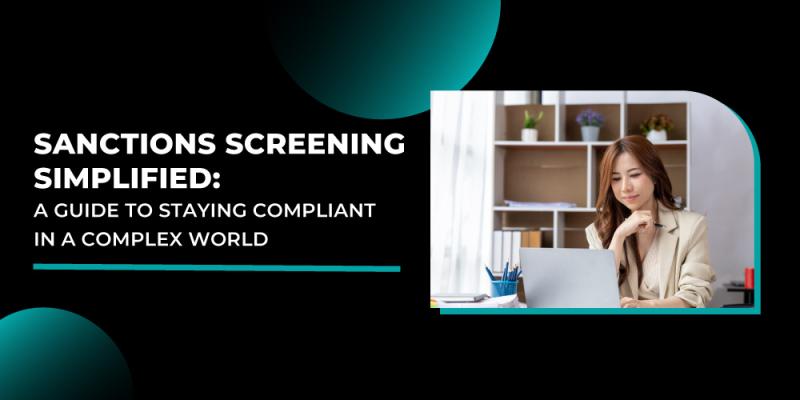Sanctions Screening Simplified: A Guide to Staying Compliant in a Complex World

In today's interconnected global economy, businesses of all
sizes face the daunting task of navigating a complex regulatory landscape. One
critical area of compliance is sanctions screening, which involves identifying
and mitigating risks associated with sanctioned individuals and entities. While
this may seem overwhelming, a strategic approach can help streamline the
process and ensure ongoing compliance.
Understanding the Basics of Sanctions Screening
Sanctions screening is the process of comparing customer,
supplier, and other relevant data against government-maintained lists of
sanctioned individuals and entities. These lists are frequently updated to
reflect changes in geopolitical situations and evolving regulatory
requirements. By performing regular screenings, businesses can proactively
identify and prevent transactions with sanctioned parties, thereby avoiding
significant legal and financial penalties.
The Importance of Sanctions Screening
- Legal
Compliance: Failure to comply with sanctions regulations can result in
severe consequences, including hefty fines, asset freezes, and even
criminal charges.
- Reputation
Protection: Involvement in sanctioned activities can tarnish a
company's reputation and erode customer trust.
- Risk
Mitigation: By identifying and avoiding high-risk transactions,
businesses can safeguard their assets and minimize exposure to potential
losses.
Challenges in Sanctions Screening
Despite its importance, sanctions screening presents several
challenges:
- Complex
Regulatory Landscape: The ever-evolving nature of sanctions
regulations makes it difficult to stay up-to-date with the latest
requirements.
- Data
Quality and Accuracy: Inaccurate or incomplete data can lead to false
positives and missed matches, hindering effective screening.
- Scalability:
As businesses grow, so does the volume of data to be screened, requiring
efficient and scalable solutions.
- Time-Consuming
Manual Processes: Manual screening processes are prone to human error
and can be extremely time-consuming.
Leveraging Martech for Efficient Sanctions Screening
To overcome these challenges, businesses can leverage
Martech solutions to automate and streamline their sanctions screening
processes. Martech, or Marketing Technology, encompasses a wide range of tools
and platforms that can be used to enhance marketing and sales efforts. However,
these tools can also be applied to compliance functions, such as sanctions
screening.
Here are some key ways Martech can be used to improve
sanctions screening:
- Data
Integration and Enrichment: Martech platforms can seamlessly integrate
data from various sources, including customer relationship management
(CRM) systems, financial systems, and third-party data providers. This
consolidated data can be enriched with additional information, such as
geolocation data, to enhance screening accuracy.
- Real-Time
Screening: Martech solutions can enable real-time screening of
transactions and customer data, reducing the risk of processing sanctioned
transactions. This is particularly important for high-volume businesses
that need to make quick decisions.
- Advanced
Analytics: By leveraging advanced analytics techniques, Martech
platforms can identify patterns and anomalies in data, helping to flag
potential risks and prioritize investigations.
- Workflow
Automation: Martech tools can automate routine tasks, such as data
cleansing, list updates, and alert generation, freeing up compliance teams
to focus on more strategic activities.
Best Practices for Effective Sanctions Screening
In addition to leveraging Martech, businesses should adopt
the following best practices to ensure robust sanctions screening:
- Centralized
Data Management: Maintain a centralized repository of customer and
transaction data to facilitate efficient screening.
- Regular
List Updates: Stay current with the latest sanctions lists and
regulatory changes.
- Risk-Based
Approach: Prioritize screening efforts based on risk factors, such as
customer type, transaction value, and geographic location.
- Robust
Due Diligence: Conduct thorough due diligence on new customers and
suppliers, including background checks and verification of identity
documents.
- Employee
Training: Provide regular training to employees on sanctions
regulations and screening procedures.
- Monitoring
and Reporting: Establish a robust monitoring and reporting system to
track compliance performance and identify potential issues.
Conclusion
Sanctions screening is a critical component of a
comprehensive compliance program. By understanding the challenges and
leveraging Martech solutions, businesses can streamline their screening
processes, reduce operational costs, and mitigate the risks associated with
non-compliance. By prioritizing sanctions screening and adopting best
practices, businesses can protect their reputation, maintain regulatory
compliance, and build a strong foundation for long-term success.
Post Your Ad Here
Comments